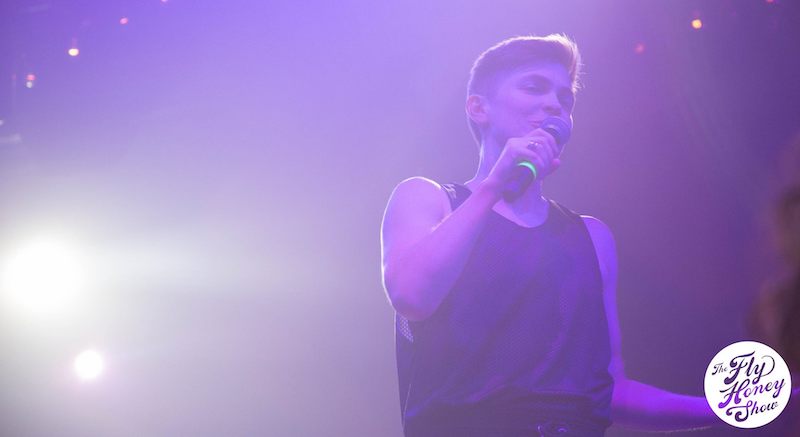KALAMAZOO, MI — It is often the case that the dance festival setting provides a broad, but shallow view of an artist’s work. It’s an understandably impossible conundrum; festival organizers throughout the country want to bring as much variety as they can to audiences, and offer opportunities to as many artists as possible. In coming to the Midwest Regional Alternative Dance Festival (RAD Fest) for the first time last year, it occurred to me that this was a festival which strikes a healthy balance, taking a refreshingly broad definition of dance and managing to get big ideas and salient works across on a packed weekend of programing. But still, it wasn’t possible to really flesh out what any one artist was trying to say in an evening.
So it’s a value add, in RAD Fest’s 10th anniversary season, that the Long Works Live Performance has been tacked on, in which three groups and one solo artist were afforded a luxuriously long bit of time on downtown Kalamazoo’s Epic Center stage. Too long, apparently, with the whole evening clocking in at two-and-a-half hours, but no one piece on its own left me itching, wishing they’d “get on with it.” On the contrary, the extra space and time were just the breathing room these four works needed; like the slow pouring of wine into a decanter to breathe, because wine (and dance) tastes better when you have the patience to wait for it.
This was never truer than with “Small Boobs,” a nearly hour-long work by Chicago’s Nora Sharp which made up the evening’s second half. I’d seen bits and pieces of Sharp’s monologue as part of the Fly Honey cabaret, but had yet to see the more movement-based parts of this work. “My name’s Nora Sharp, and my pronouns are… dealer’s choice,” they say through a microphone near the beginning. I’ll choose they/them.
The premise is not small boobs, per se, but rather is an uncovering of the many layers of Sharp’s sexual and gender identity, almost in real time. Much of this work is spent at that microphone, leaving us to wonder if we’ve inadvertently attended a comedy set. But there’s a keen physicality Sharp exudes at the mic — it’s as much a dance, if not more, than later parts of the piece tracing linear paths through the space which, for me, echoed an earlier story about being a kid playing defense on an AYSO soccer team.
It’s a long way from Sharp’s “For Our Purposes,” a quartet created in collaboration with their brother Sam Sharp in 2016. Then again, maybe it isn’t. Sharp’s early training is in music, but their artistic sensibilities for dance and performance are being fleshed out much like their identity: in real time. As an observer, I wanted to take a red pen to “Small Boobs” and edit out the many winding, tangential big ideas that find their way into the piece, because its main subject, Sharp, is enough on its own. Clunky quirkiness in their movement and singing voice are all part of this journey, easily forgiven, if not embraced, due to Sharp’s infectious charm and good intentions. Simply put: “Small Boobs” is fascinating to watch.
The first half of the night featured two duets and a trio, the latter a late addition to the program after one artist unexpectedly pulled out. It’s called “Mental Kingdoms,” originally intended as an excerpt for the late show on Saturday. Three women based in Huntington, WV — Angela Dennis, Jessica Lynn Fox and Laurie Bohren — began a largely improvised set to a sound score mixed live by Bary Center. Behind Center, projections of sunshine sparkling through the trees dissolved into contrasting colors and muddled abstraction, a good way to describe the movement that unfolds.
I’ve seen Fox once before, last year at RAD Fest in a duet with Detoit-based hip-hop artist Bird Clarkson. She’s a captivating performer, with piercing eyes that could reach the back row of any theater. In the intimate Epic Center space, Fox and her colleagues offer a span of emotional investment that ranges from too-cool-for-school to wholly apathetic, though Fox can’t fully turn off her instincts as a performer. I think this lack of expressivity is intentional; the movement is equally morose at the start, slithering across the floor in slow-motion wriggles which morph into un-committed partnering. A few flourishes snap them out of this malaise, inspired by particular moments accentuated in the sound score. It creates the climax we think we’re craving, but honestly, those “dancier” moments just made me question “Mental Kingdom’s” meticulously banal beginning and end.
Two duets, “Elegy” by Kent De Spain of Dayton, OH, and RAD Fest curator Rachel Miller’s “They,” share a few things in common, though on the surface, they don’t look at all the same.
“Elegy” begins cautiously, with a man and woman (De Spain and Leslie Dworkin) in the same clothes — white tank top and black pants — seated in chairs spending long moments with a single gesture like an arm extended to the side, or leaning forward with elbows to knees, or scanning the audience to gaze right toward the wings. The music is Arvo Part, a minimalist’s dream.
By contrast, Miller and her partner, Dmitri Peskov, swap gender roles in their costumes. Miller wears a huge, boxy suit coat and pants while Peskov dons a flowy chiffon frock. They oscillate between hyper-masculine boxing and bodybuilder poses and coy model walks. The music is Marilyn Manson, a minimalist’s nightmare.
But there’s something interesting about these two pieces, considered side by side. Both seem to get at something about gender, and use repetition to build trust with us, the audience, and then carefully, intentionally, dismantle that trust to effectively defy expectation.
Header photo of Nora Sharp by Kelainephoto
